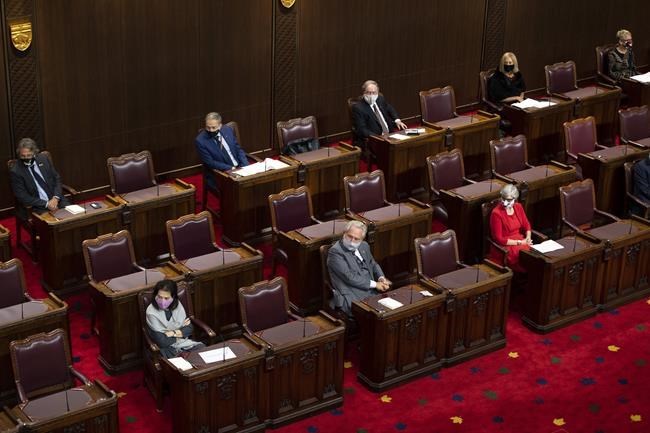A Senate report released Thursday says Canada can make major strides in suicide prevention if all levels of government develop strategies tailored towards men and Indigenous people, the groups facing the highest suicide rates.
The Senate Committee on Social Affairs, Science and Technology also says the Federal Framework for Suicide Prevention Act has done little to bring down the rate of suicides across Canada since it was adopted in 2016 because it does not prioritize evidence-based interventions for suicide prevention and does a poor job at tracking the issue.
Sen.Patrick Brazeau, a member of the Algonquin community of Kitigan Zibi and a committee member, says he pushed for a study of suicide in Canada after he tried to take his own life twice almost a decade ago.
"I was hurting," the senator says in the report.
"Some people have lost cherished ones to this and just can’t handle it, but for those who can handle it, it is very important they share their voices and stories … There are many people having problems in Canada today."
The report found that men account for 75 per cent of suicides in Canada. Indigenous leaders told the committee that "Inuit experience suicide at roughly 6 to 25 times the national rates, depending upon region and also demographics."
The report said men die more by suicide because "men choose more lethal means of suicide, like firearms."
Brazeau says Canada needs to conduct a gender-based analysis of the programs available because the report has found there are more prevention efforts available for women than for men.
Brazeau says this could be because, historically, men have also been taught to hide their emotions which makes taking care of their mental well-being more difficult.
"(We think) men are strong, men are supposed to be tough, and men don't have to get help, and they'll sort it out on their own," Brazeau said. "I'm living proof that's not the case."
The report said various evidence-based approaches can reduce suicide among the overrepresented groups, including "means restrictions."
"Means restriction aims to make the most common and lethal methods of suicide more difficult to access" the report says, recommending Canada limit gun ownership and strengthen border surveillance on firearms trafficking.
The reports states multiple factors, including the effects of colonialism, have hurt Indigenous well-being and the 2016 framework needs to acknowledge this.
"Realities differ quite a bit from First Nations, to Métis, to Inuit and; from urban Indigenous peoples to those on reserves, or in rural areas," the report says.
"Witnesses emphasized the importance of providing accessible care and intervention to all Indigenous peoples, whether they live in urban, rural, or remote environments."
It also emphasized programming for suicide prevention should involve Indigenous care.
The Senate report says primary care physicians can also greatly benefit from suicide prevention efforts.
The federal Minister of Mental Health and Addictions Carolyn Bennett has told the Senate "the College of Family Physicians is currently planning to extend the two-year residency to three years to accommodate additional training in mental health, addictions and pain," the report says.
Bennett did not immediately respond to a request for comment on the report but the Senate says the minister has informed the committee work is being done to update the 2016 framework.
The report also calls for Canada to create a national suicide data collection system that is consistent from province to territory and urged the existing 2016 framework to formally acknowledge the disproportionately high suicide rates among Indigenous people, as well as men and boys.
Brazeau says the Senate's next step is to discuss the report with the federal government, which will then prepare a response to its findings.
"It's important that future governments take those recommendations and focus on the target populations," Brazeau said.
If you or someone you know is thinking about suicide, support is available 24/7 by calling Talk Suicide Canada (1-833-456-4566) or, for residents of Quebec, 1 866 APPELLE (1-866-277-3553).
This report by The Canadian Press was first published June 8, 2023.
Fakiha Baig, The Canadian Press
